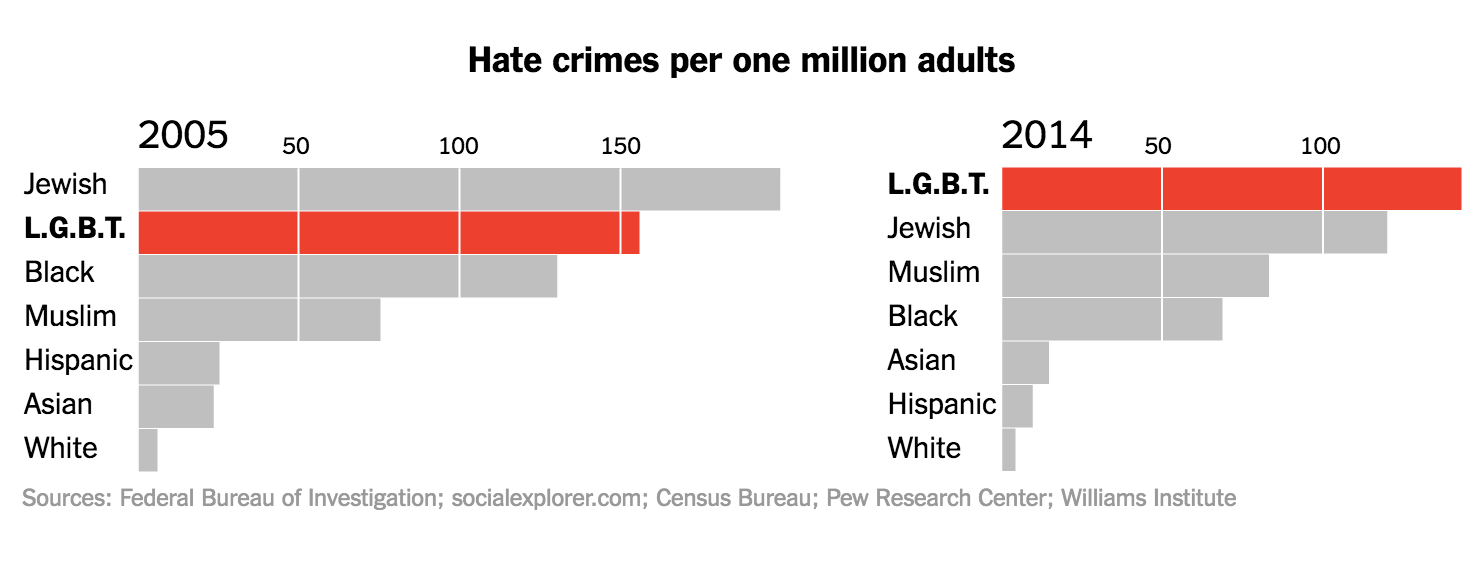The Pulse shooting in Orlando was undoubtedly a hate crime targeting LGBT people — and it wasn’t an isolated incident. As we continue to unpack what happened, the New York Times has released an analysis of FBI data showing that LGBT people face a greater risk of hate crimes than any other minority group.

The FBI data is from 2014, but it’s been recently reexamined in light of the Orlando shooting. In 2014, 5,462 “single-bias incidents” (hate crimes with a single motivation) were counted by the FBI. Nearly a fifth of those — 1,115, to be exact — were based on the victim’s actual or perceived sexual orientation or gender identity (presumably their LGBT status). Transgender people and people of color continue to be disproportionately represented.
This makes LGBT people more likely to be targeted by hate crimes than any of the other minority groups the FBI tracks (Jewish people, Muslims, African Americans, Asians, Hispanic/Latino people, and women).
Ironically, part of the reason for violence against L.G.B.T. people might have to do with a more accepting attitude toward gays and lesbians in recent decades, say people who study hate crimes.
As the majority of society becomes more tolerant of L.G.B.T. people, some of those who are opposed to them become more radical, said Mark Potok, a senior fellow at the Southern Poverty Law Center.
The flip side of marriage equality is that people who strongly oppose it find the shifting culture extremely disturbing, said Gregory M. Herek, a psychology professor at the University of California, Davis, who is an expert on anti-gay violence.
“They may feel that the way they see the world is threatened, which motivates them to strike out in some way, and for some people, that way could be in violent attacks,” Mr. Herek said.
Hate crimes are also tricky to track. Statistics rely on victims to self-report incidents, which they may be less likely to do for fear of outing, retaliation, or inaction. And areas that are less accepting of LGBT people may have more lax policies — or attitudes — in place for tracking and responding to hate crimes.
A handful of examples:
A recent report by the Bureau of Justice Statistics found that most crimes are not reported to the police, and those that are reported are frequently not classified as hate crimes by local jurisdictions.
A recent investigation by The Associated Press found that thousands of city police and county sheriff’s departments had not filed a single hate crime report to the F.B.I. between 2009 and 2014.
Larger cities or cities with a more visible L.G.B.T. community are more likely to have procedures and training in place to detect and reduce hate crimes.
For example, in 2014 only one hate crime was reported for the entire state of Mississippi. In Connecticut, where L.G.B.T. people are arguably more visible and influential, 23 hate crimes based on sexual orientation were reported, Mr. Herek said.
While some Republicans have refused to acknowledge that the Pulse shooting targeted LGBT people, Logo’s Cody Gohl points out why it’s not enough to simply refer to the event as an act of terrorism:
Describing a hate crime as an act of terrorism (as many politicians were wont to do in the aftermath of the Orlando massacre) downplays the role that a specific group’s identity played in the crime. This erasure halts progress and redirects the conversation away from the very real and horrific roots of the atrocity, in this case that the men and women murdered at Pulse were specifically targeted for being members of the LGBT Latinx community.
Can the Orlando shooting be considered an act of terror? Absolutely. But it was also an act of hate that targeted a particular group of people, adding more names to an already too-long list of victims of hate crimes. The numbers don’t lie; this is a national epidemic that doesn’t stop at Pulse.



It’s Moving Day for the Friendly ..."
It’s Moving Day for the Friendly ..."
It’s Moving Day for the Friendly ..."
It’s Moving Day for the Friendly ..."